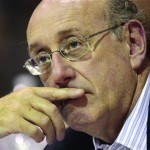His work has immersed him in events that read like a roster of recent catastrophes, from 9/11 to the Gulf oil spill. Now, Kenneth Feinberg is adding the Boston Marathon bombings to that list.
The Massachusetts native and attorney is managing the payouts from The One Fund, which was established to help victims of the explosions that killed three and injured 260.
Feinberg is experienced dealing with people facing profound loss, but he doesn’t seek the work.

“I must tell you every time I do one, you say to yourself, ‘God I hope this is the last one,” he said.
Feinberg handled victims’ compensation after 9/11, the BP oil spill, the Virginia Tech shootings and the Colorado movie theater shootings, among other calamities.
He’s now advising a panel distributing money after the elementary school massacre in Newtown, Conn., and mediating Penn State’s settlement discussions with the sex abuse victims of former football coach Jerry Sandusky.
The experiences are wrenching, he said. And recipients invariably resent him, thinking he’s trying to put a price on the priceless things they’ve lost.
“Don’t expect thanks or appreciation or gratitude, none of that,” Feinberg said. “We have very emotional victims and you’re offering them money instead of a limb, instead of the return of a family member. This is a no-win situation.”
He keeps saying yes in the same spirit of those who donate, he said.
“Look at the amount of money that pours in from private people, private citizens,” he said. “How do you say no if the governor calls, the mayor?”
The 67-year-old Feinberg is a native of Brockton, about 20 miles south of Boston, and his Washington D.C. firm specializes in mediation and dispute resolution. In 1984, a judge appointed him to distribute money from a $180 million settlement for veterans who were exposed to Agent Orange. His work on that project got notice from President George W. Bush’s administration, which asked him to manage the 9/11 victims’ compensation fund.
Since then, the calls have come regularly.
Most of his work is pro bono, including the Boston Marathon job. But Feinberg is being paid for the Penn State job and was paid by BP after the oil spill — a job that saw Feinberg absorb significant abuse. In his 2012 book, “Who Gets What,” he said he became a “human pinata.” Residents complained about the speed and distribution of the payouts, and insults flew at public meetings. “You are such a lying piece of (garbage),” one person told him.
Lawyers, meanwhile, scoffed at his vigorous declarations of independence from BP, which he still makes.
“The spin was that he was independent, but he was working for BP, that’s just the way it is,” said attorney Anthony Tarricone, now of the Boston firm Kreindler & Kreindler, who represented both BP and 9/11 families.
But Tarricone called Feinberg the perfect person to manage the Boston fund, citing both his legal skills and his respectful manner with the 9/11 families.
“He was fair, he listened to the families, the families felt as if they were being listened to, and that he was understanding what they were going through,” Tarricone said.
Former U.S. Attorney General John Ashcroft, who appointed Feinberg to handle the 9/11 fund, said Feinberg balances compassion with vigilance in managing the money.
“I can’t say exactly how he handles it emotionally and psychologically. I just know that he does it professionally,” Ashcroft said. “I don’t think the world would keep going back, knocking on his door, saying, ‘Ken, we need you again,’ if they were displeased.”
The One Fund had notched more than $26 million by Saturday. Its eventual total will determine exactly who can be helped. For instance, compensation for deaths is the top priority, followed by compensation for physical injuries. Payment for psychological damages comes only if there’s money left, Feinberg said.
In Boston, Feinberg will be dealing with complex injuries, such as numerous amputations, including cases where victims lost both legs. Feinberg hopes to be ready to meet with families by June 15 and get checks out by June 30.
By then, he’ll have immersed himself in Boston’s stories, and all the senseless pain and loss. The classical music aficionado will also likely have relied on the refuge offered in the music of composers he cherishes.
“During the day, I’m working on a project that shows you how uncivilized some people can be and how they willy-nilly, at random, kill and maim people,” he said. “And at night you turn on Mozart, and it’s the height of civilization.”
It helps him recognize, he said, “that mankind isn’t all bad.”




















 Nearly 26.2M Workers Are Expected to Miss Work on Super Bowl Monday
Nearly 26.2M Workers Are Expected to Miss Work on Super Bowl Monday  Flood Risk Misconceptions Drive Underinsurance: Chubb
Flood Risk Misconceptions Drive Underinsurance: Chubb  What Analysts Are Saying About the 2026 P/C Insurance Market
What Analysts Are Saying About the 2026 P/C Insurance Market  Five AI Trends Reshaping Insurance in 2026
Five AI Trends Reshaping Insurance in 2026 




